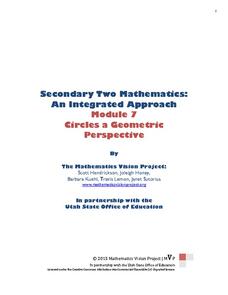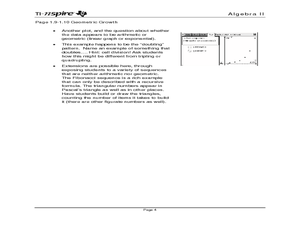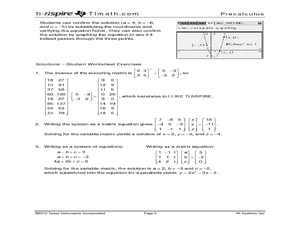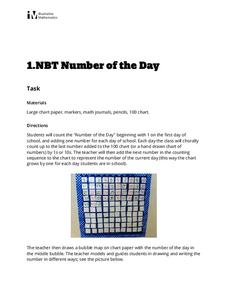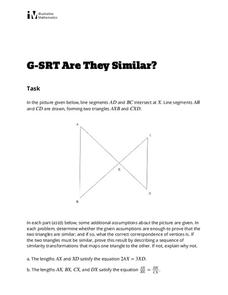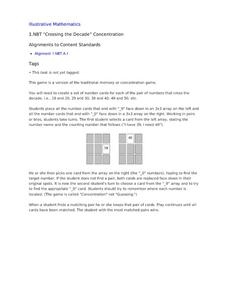Curated OER
Six Number Pattern and Sequence Activities
In this numbers and sequences worksheet, students solve problems presented in six different activities. Extension problems are also provided.
Curated OER
Limit of a Sequence
Young scholars solve problems using limits in this calculus lesson. They calculate the solution to a problem by substituting in positive integers and relate the sequence output as it relates to the limit of a function.
Curated OER
Activity Plan Mixed Ages: Family Math
Students play with math. In this early childhood lesson plan, students create drawings of family members to use for math activities including counting, seriating, sorting, grouping, and sequencing.
Curated OER
Points on a Line
Get your learners up and moving, all while reviewing numbers on the number line! For this activity, learners are grouped in teams outdoors. The teacher will have already created number lines on the ground (with chalk, tape, etc.), and...
Education World
The African American Population in US History
How has the African American population changed over the years? Learners use charts, statistical data, and maps to see how populations in African American communities have changed since the 1860s. Activity modifications are included to...
Curated OER
The Rest of the 7s
Help your fourth graders master the 7 times table. They complete number sequences and solve multiplication problems in numerical and written formats. Once they finish this activity, they'll be ready to take on 8s and 9s!
101 Questions
The Incredible Shrinking Dollar
Make money disappear! Young scholars watch as a copier shrinks a dollar bill to 75 percent of its size. Learners are left to determine the size of the dollar bill after nine passes through the copier.
Mathematics Vision Project
Circles: A Geometric Perspective
Circles are the foundation of many geometric concepts and extensions - a point that is thoroughly driven home in this extensive unit. Fundamental properties of circles are investigated (including sector area, angle measure, and...
Curated OER
Geometric Sequences and Series
Learn to calculate the nth term of a sequence defined by an algebraic expression. They examine geometric sequences and series, relate geometric sequences to their explicit forms, find the partial sums of a sequence in a table, and...
Curated OER
Geometric Sequences and Series
Learners find common ratios of geometric sequences on a spreadsheet. Using this data, they create scatter plots of the sequences to determine how each curve is related to the value of the common ratio. They will consider whether series...
Curated OER
Sequence Graphs
Investigate arithmetic and geometric sequences by using a graphing calculator to determine if a sequence is linear or exponential.
Curated OER
All Systems Go!
Secret codes are so much fun, and a great way to practice nearly any math skill. Let your class become code breakers as they investigate inverse matrices. They use TI-Nspire technology to solve systems of equations which help them crack...
Curated OER
Sequences and Linear Equations
Learners identify the formula to find the nth term. For this algebra lesson, students finish a pattern and identify missing parts in a sequence. They write an equation given a partial sequence.
Illustrative Mathematics
Start/Stop Counting II
Take stroll around the classroom while teaching young mathematicians to count fluently with this whole-group math activity. The teacher starts things off by walking around the room while counting up from the number one and continues...
Mathematics Vision Project
Geometric Figures
Logical thinking is at the forefront of this jam-packed lesson, with young mathematicians not only investigating geometric concepts but also how they "know what they know". Through each activity and worksheet, learners wrestle with...
Illustrative Mathematics
Number of the Day
Daily routines not only help to manage classrooms, they can also provide learners with rich opportunities for learning. This activity supports young learners in developing their number sense by counting up the school days on a class 100...
West Contra Costa Unified School District
Writing Exponential Functions Based on Data
Give your class a concrete example of exponential growth and decay using this hands-on activity. These Algebra II lessons allow for the exploration of exponential growth and decay models, as well as the discovery of the patterns of each....
Illustrative Mathematics
Are They Similar?
Learners separate things that just appear similar from those that are actually similar. A diagram of triangles is given, and then a variety of geometric characteristics changed and the similarity of the triangles analyzed. Because the...
Dr. Seuss Enterprises
Read Across America
Celebrate the whimsical world of Dr. Seuss on Read Across America Day with a collection of science, technology, engineering, the arts, and mathematics activities, each linked to a popular Dr. Seuss story.
Computer Science Unplugged
Twenty Guesses—Information Theory
How do we determine how much information to include and what can be left out? By playing a game of 20 questions, the class generates the best strategies for finding a number. They then move on to guessing the next letter in a short...
American Statistical Association
Chunk it!
Chunking information helps you remember that information longer. A hands-on activity tests this theory by having learners collect and analyze their own data. Following their conclusions, they conduct randomization simulations to test...
Illustrative Mathematics
“Crossing the Decade” Concentration
Young mathematicians concentrate on learning to fluently count. Following the rules of the classic game Memory, children take turns flipping over cards in order to find pairs of numbers that cross a decade (e.g. 29 and 30). For younger...
Math in English
Number Patterns
Build the pattern recognition skills of young mathematicians with this simple skills practice worksheet. Given nine different sequences of two-digit numbers, children must identify the pattern and determine the next three numbers in...
Illustrative Mathematics
Christina's Candies
Help Christina figure out how many chocolate and lemon candies she has with a lesson on decomposing numbers. When presenting this context to the class, the teacher chooses the total number of candies and the number that are chocolate,...









